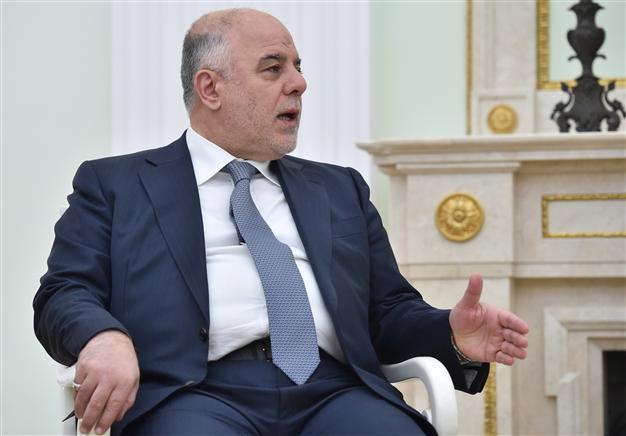Iraq urges more support against ISIL as allies talk strategy
PARIS - Agence France-Presse

AP Photo
Iraq's leader pleaded June 2 for more global support in the fight against the Islamic State of Iraq and the Levant (ISIL) as he outlined plans to claw back territory from the jihadists in crunch talks with his allies in Paris.The meeting of some 20 coalition ministers comes as Iraq is trying to win back control of Ramadi, whose seizure by ISIL militants two weeks ago struck the biggest blow to the coalition since it began striking jihadist positions in August.
US Pentagon chief Ashton Carter blamed Iraqi forces for the loss, saying there was "an issue with the will of the Iraqis to fight", in comments that angered Baghdad.
Abadi, who is to outline his plans to liberate the Sunni province of Anbar and its capital Ramadi, is also facing pressure for Baghdad to be more inclusive of the Sunni minority -- seen as key to winning the battle.
But the Iraqi prime minister wants more from his partners, saying most of the ISIL fighters who have seized large swathes of Iraq were now foreign and therefore an "international problem."
"There is a lot of talk of support for Iraq, there is very little on the ground," Abadi said.
He said that until recently, around six out of 10 fighters were Iraqi and the remainder foreign, whereas the proportion was now reversed.
The international community has to explain "why so many terrorists are from Saudi Arabia, why so many from the Gulf, why so many from Egypt, why so many from Syria, and Turkey and from European countries?"
His criticism came as ISIL claimed responsibility for a suicide attack on an Iraqi police base north of Baghdad on Monday that killed at least 37 people, mostly officers.
While the focus of the meeting is the crisis in Iraq, a high-placed French diplomat said it was "obviously also an occasion to talk about Syria."
Shortly after capturing Ramadi, the jihadists seized the historic Syrian city of Palmyra in what appeared to swing the momentum in their favour after months on the back foot there.
The diplomat said the Syrian regime was "greatly weakened", giving impetus to the need to find a political solution to the four-year war.
"We can't lose sight of the fact that without dealing with the Syrian situation, it will be very hard to stabilise Iraq," the diplomat said.
The capture of Ramadi has also exposed ancient sectarian tensions between the Shiite and Sunni sects of Islam which run deep in Iraq.
The rout of security forces prompted Abadi to call on the Hashed al-Shaabi, an umbrella organisation which includes Iran-backed Shiite militias that Baghdad and Washington had been reluctant to involve in the Sunni bastion of Anbar.
Under a plan adopted by Abadi's cabinet shortly after Ramadi's fall, the Iraqis hope to mobilise the Sunni tribes of Anbar province and ensure all Shiite militias are operating under Baghdad's authority, to avoid stoking tensions.
"It is crucial in terms of the fight against Daesh [ISIL] to have the entire Iraqi population behind the fight against terrorism," said the French diplomat.
Abadi said locals were fighting back in the northern city of Mosul, which was taken by ISIL last year, but he warned the jihadist onslaught in his country was not just an issue for Iraq.
"There is a lack of intelligence, we are trying very hard on our part but this is a transnational organisation... This is a failure on the part of the world."
Abadi said Baghdad was in need of weapons and ammunition to battle ISIL, adding that most of the country's weapons contracts were with Russia or Iran, which are both under Western sanctions.
"We are not asking for arms, but please let us purchase arms easily," he pleaded.
The suicide attack against the police base slowed an operation to retake Ramadi, but Abadi said his troops' counter-offensive was "advancing quite quickly."
He insisted "Iraqis are prepared to fight" and said he was "investigating why some local commanders issued commands for the forces to withdraw" during the ISIL attack on the city.
Abadi said the move was likely to "protect their own forces", outlining techniques used by the jihadists.
He said small numbers of fighters took control of mosques, using their loudspeakers to issue threats against troops, striking fear into the population and security forces.
















